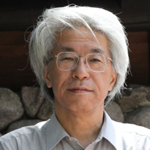
Takao Kondo
Takao Kondo received his B.S. from Nagoya University in 1970, and his Ph.D. from the same institution in 1977. Following a short postdoctoral fellowship at Nagoya University, he was appointed Assistant Professor of the National Institute for Basic Biology, in Okazaki, Japan, in 1978. He later traveled abroad as a visiting scientist first to Harvard University (1985) and then to Vanderbilt University (1990-91) where he began his research and international collaborations on the circadian clock of cyanobacteria. In 1995, he was appointed Professor of Biology at Nagoya University. He served as Dean of the School of Science (2006-2009) and President of the Institute for Advanced Research of Nagoya University (2007-2013), and is now a Designated Professor and Professor Emeritus of Nagoya University.
Dr. Kondo has made major contributions to our understanding of the molecular basis for circadian clock in cyanobacteria. He developed the experimental system using Synechococcus by introducing a luciferase reporter gene to isolate many clock mutants, and allow him to identify the kai genes. In 2005, his team found that the 24-hr rhythms of KaiC phosphorylation occur autonomously just by mixing three Kai proteins and ATP in a test tube. As the reconstituted rhythm was almost identical to that found in living cells, this finding was a novel and creative discovery because it allowed us to study the circadian rhythm in vitro using only three proteins and ATP. This finding also had a major impact on the fields of biochemistry and biophysics by introducing the concept and possibility of using proteins to measure time and to process information.
His honors include the Aschoff-Homna Prize 1995, Chunichi Prize 2005, Japanese Society of Botany Prize 2006, Asahi Prize 2007, JSPS Prize 2007, Medal with Purple ribbon and Kihara Prize in 2011, and The Japan Academy Prize in 2014.
スピーカーリストに戻る |
|

